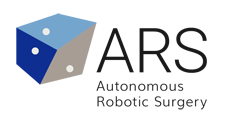prof. fiorini guest at radio 24 smart city
Voices and places of innovation, with Maurizio Melis
3 and 4 March 2022, on radio24
Prof. Paolo Fiorini guest of the broadcast of Radio24 Smart City – Voices and places of innovation to tell the general public about the challenges of autonomous surgical robotics.
How to teach a robot to be a good surgeon
How to teach a robot to be a good surgeon
Human communication is full of implications. The spoken one, and also the written one, full of implications and unspoken things, taken for granted.
For robots, however, almost nothing is taken for granted. So if you want to teach a robot how surgery is done, you can’t just give it surgery textbooks to read, as they don’t even remotely contain all the information the robot would need to perform surgery on its own.
Problems such as giving a robot the knowledge to tackle a task, or providing it with a logical context within which to give meaning to the words of a human (also full of implicit references) are at the heart of the European project ARS (Autonomous Robotics Surgery ) in progress at the ALTAIR Lab, at the University of Verona, where we bring you in this episode.
Surgical robots: the five levels of autonomy and the challenge of certification
Surgical robots: the five levels of autonomy and the challenge of certification
Let’s go back to robotic surgery in this episode of Smart City to take stock of the development of autonomous surgical robots, that is, capable of performing at least part of a surgical procedure independently. Robots capable of performing routine tasks in the operating room could be very valuable, relieving surgeons of repetitive tasks and allowing them to focus on the more delicate phases of the surgery.
But in addition to the technological obstacles, which we talked about in last night’s episode, the use of these robots poses numerous new problems regarding the certification procedures and – similarly to other sectors of robotics – the attribution of responsibilities in case of errors.
